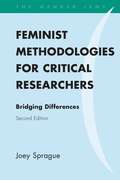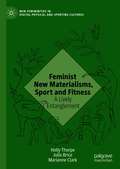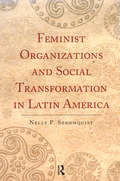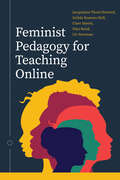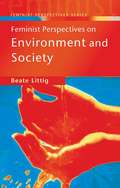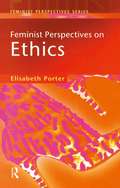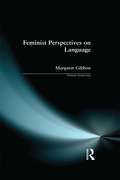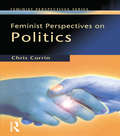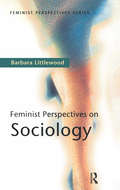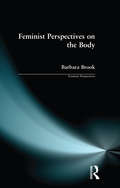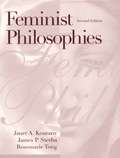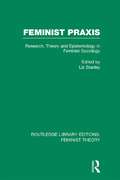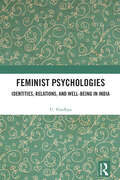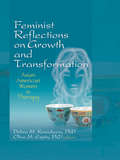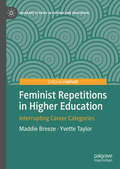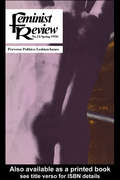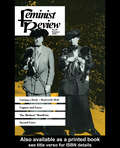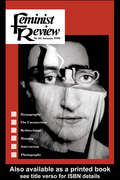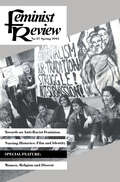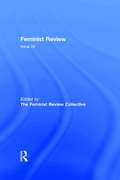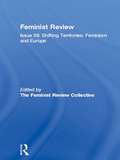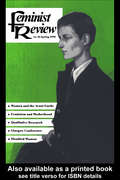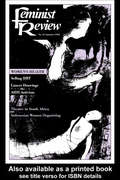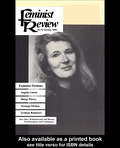- Table View
- List View
Feminist Methodologies for Critical Researchers: Bridging Differences, Second Edition
by Joey SpragueA discussion of why methodology matters & how it affects the impact of social science research on society. Sprague defends the social scientific project & then shows how to engage with this project in ways that embody feminist values while producing first rate research results.
Feminist New Materialisms, Sport and Fitness: A Lively Entanglement (New Femininities in Digital, Physical and Sporting Cultures)
by Holly Thorpe Julie Brice Marianne ClarkThis book offers the first critical examination of the contributions of feminist new materialist thought to the study of sport, fitness, and physical culture. Bringing feminist new materialist theory into a lively dialogue with sport studies, it highlights the possibilities and challenges of engaging with posthumanist and new materialist theories. With empirical examples and pedagogical offerings woven throughout, the book makes complex new materialist concepts and theories highly accessible. It vividly illustrates sporting matter as lively, vital, and agentic. Engaging specifically with the methodological, theoretical, ethical and political challenges of feminist new materialisms, it elaborates understandings of moving bodies and their entanglements with human, non-human, technological, biological, cultural, and environmental forces in contemporary society. This book extends humanist, representationalist, and discursive approaches that have characterized the landscape of critical research on active bodies, and invites new imaginings and articulations for sport and moving bodies in uncertain times and unknown futures.View the video abstracts for each of the book's chapter here: Chapter 1 https://www.youtube.com/watch?v=3UQy7aq1k20&list=PLdbxSLlj0ri04cOHxK37TfaQg0IAv6Znf&index=1 Chapter 2 https://www.youtube.com/watch?v=yM-Q4FmW6h8&list=PLdbxSLlj0ri04cOHxK37TfaQg0IAv6Znf&index=2 Chapter 3 https://www.youtube.com/watch?v=D0VxosyyrKg&list=PLdbxSLlj0ri04cOHxK37TfaQg0IAv6Znf&index=3 Chapter 4 https://www.youtube.com/watch?v=eN9b58fPISA&list=PLdbxSLlj0ri04cOHxK37TfaQg0IAv6Znf&index=4 Chapter 5 https://www.youtube.com/watch?v=GM3Ss_Tz0ZY&list=PLdbxSLlj0ri04cOHxK37TfaQg0IAv6Znf&index=5 Chapter 6 https://www.youtube.com/watch?v=pNbSBThlR6s&list=PLdbxSLlj0ri04cOHxK37TfaQg0IAv6Znf&index=6 Chapter 7 https://www.youtube.com/watch?v=NFRAGwH8UOY&list=PLdbxSLlj0ri04cOHxK37TfaQg0IAv6Znf&index=7
Feminist Organizations and Social Transformation in Latin America
by Nelly P. StromquistAway from the public eye, but from within the structures of stable and efficient organizations, women's groups have established nongovernmental organizations (NGOs) to pursue feminist agendas. Feminist Organizations and Social Transformation in Latin America constitutes one of the first detailed analyses of the political and educational work of these organizations. Focusing on NGOs in the Dominican Republic and Peru, the book presents three case studies of feminist work, showing the careful balance they must navigate among satisfying basic needs, promoting legislation to address profound gender asymmetries, and creating countercultures essential to the development of a gender-attenuated society. In documenting the work of feminist NGOs, Stromquist identifies the ways they provide nonformal education (outside the school system) and informal learning (through experiences and internal discussions) to produce a new consciousness and assertive identities among women.
Feminist Pedagogy for Teaching Online
by Enilda Romero-Hall Jacquelyne Thoni Howard Clare Daniel Niya Bond Liv NewmanInstructors across higher education require inspiring and practical resources for creating, adapting to, and enhancing, online teaching and learning spaces. Faculty need to build collaborative, equitable and trusting online learning communities. This edited volume examines the experiences that interdisciplinary and global feminist educators have had—both their successes and their challenges—in infusing feminist pedagogical tenets into their online teaching and learning practices. Contributors consider how to promote connection, reflexivity, and embodiment; build equity, cooperation, and co-education; and create cultures of care in the online classroom. They also interrogate knowledge production, social inequality, and power. By (re)imagining feminist pedagogy as a much-needed tool and providing practical advice for using digital technology to enact these tenets in the classroom, this collection will empower educators and learners alike.
Feminist Perspectives on Environment and Society (Feminist Perspectives)
by Beate LittigFor courses in Environmental studies, Environmental Sociology, Environmental geography and Development studies; Women's studies and Women's issues options on a wide variety of degree courses. Combining theory with practice, this concise, accessible text provides a comprehensive introduction to the concepts, theories and results of environmental sociology from a feminist perspective. Within an international context it portrays in full the different feminist perspectives on environment and society, which are marginalized in mainstream research, and shows how the feminist critique on environmental sociology contributes to a more general feminist critique of society. Part of the Feminist Perspectives Series providing stimulating introductions to key feminist topics and debates written by well-known, experienced teachers in each field.
Feminist Perspectives on Ethics (Feminist Perspectives)
by Elizabeth PorterFeminist Perspectives on Ethics is a unique guide to the development of feminist thought on ethics and moral agency. Each chapter offers a survey of feminist debates on key areas: the nature of feminist ethics; intimate relationships; professional ethics; politics; sexual politics; abortion and reproductive choices. Importantly, the author draws on the range of ideological viewpoints that exist to demonstrate the rich diversity of feminism and also attempts to break down dualistic, discordant or simplistic understandings of ethics.
Feminist Perspectives on Language (Feminist Perspectives)
by Margaret GibbonThe Feminist Perspectives Series seeks to provide concise, accessible and engaging introductions to key feminist topics and debates. The texts in the series are designed to be used on a wide range of courses exploring feminist issues and are written by experienced teachers who are also well known in their respective fields. Each book in the series includes the most up-to-date statistics, research data, key sources and suggestions for further reading.Feminist Perspectives On Language provides an accessible introduction to this complex area. It redresses the balance of current feminist texts which tend to concentrate on discourse analysis and fail to connect with feminist thought in other disciplines such as sociology and politics. The text is divided into two parts, the first looks at language itself, how we learn language exploring such questions as; Does language free or trap us? Does our language affect how we come to understand the world around us? Is our language sexist? If so, does that reflect male dominance in society? and many more issues. Part Two explores questions of methodology and interpretation examining language in use, communication styles and the analysis of conversation.
Feminist Perspectives on Politics (Feminist Perspectives)
by Chris CorrinFeminist Perspectives on Politics considers how feminist perspectives have considerably broadened the scope of what is considered 'political'. Themes and issues covered range from nineteenth century debates around women's equality and liberation, to twentieth century arguments and activities towards gaining a more nuanced understanding of women's differences and diversity. ' Difference' remains a key term in contemporary feminisms, and the author examines debates engendered from women's liberation politics to open up discussion of Black feminisms, lesbian politics and disabled feminist agendas. Formal political participation and the impact of women's movement politics are assessed in global comparisons as are the debates surrounding discourses on 'development' and transnational politics, and the influence of women at local, national and international levels. The book will be essential reading for students at all levels across the fields of Politics, Women's Studies, Sociology, History, Cultural Studies, Political Economy and 'Development' Studies more generally (such as in studies concerned with anti-racism, gender, social policy and the history of ideas within educational institutions, local government and voluntary organisations)
Feminist Perspectives on Sociology (Feminist Perspectives)
by Barbara LittlewoodThe Feminist Perspectives Series seeks to provide concise, accessible and engaging introductions to key feminist topics and debates. The texts in the series are designed to be used on a wide range of courses touching feminist issues and are written by experienced teachers who are also well known in their respective fields. Each book in the series includes the most up-to-date statistics, research data, key sources and suggestions for further reading.Feminist Perspectives on Sociology examines how sociology has been transformed under the influence of feminism in recent years. This transformation consists both of a critique of established areas and the opening up of new ones. Areas and issues covered include approaches to knowledge and research, patriarchal relations, work in and outside the home, body politics, sport and fitness, migration, violence, the state, and globalisation. The book also reviews a range of ‘post’ perspectives and arguments including postmodernism, postcolonialism and postfeminism. Feminism is also a transformative social movement. Its political impact, from local to transnational levels, has to be taken into account in assessing developments in sociology, providing it with a connection between research and action.Key featuresProvides a comprehensive and accessible introduction to feminist perspectives in sociology Discusses and assesses sociological and feminist theories in relation to case studies Covers a wide range of current issues that will interest readers from many disciplinary backgrounds Includes end of chapter summaries, suggestions for further reading and a glossary of key termsBarbara Littlewood is Lecturer in Sociology, University of Glasgow.
Feminist Perspectives on the Body (Feminist Perspectives)
by Barbara BrookFeminist Perspectives on the Body provides an accessible introduction to this extremely popular new area and is aimed at students from a variety of disciplines who are interested in gaining an understanding of the key issues involved. The author explores many important topics including: the Western world's construction of the body as a theoretical, philosophical and political concept; the body and reproduction; medicalisation; cosmetic surgery and eating disorders; the body in performance; the private and the public body; working bodies and new ways of thinking about the body.
Feminist Philosophies: Problems, Theories, and Applications
by James P. Sterba Rosemarie Tong Janet A. KouranyThis anthology of 40 readings combines both an extensive discussion of the major problems confronting women with an in-depth analysis of the alternative theoretical and practical means for resolving these issues.
Feminist Popular Education in Transnational Debates
by Linzi Manicom Shirley WaltersThis book is a collection of grounded accounts by feminist popular educators and reflects critically on processes of collective learning and self- and social transformation in various geopolitical settings. Engaging contemporary feminist political issues and theory, contributors explore emerging pedagogical practices.
Feminist Praxis: Research, Theory and Epistemology in Feminist Sociology (Routledge Library Editions: Feminist Theory)
by Liz StanleyFeminist social scientists often find that carrying feminism into practice in their research is neither easy nor straightforward. Designed precisely with feminist researchers in mind, Feminist Praxis gives detailed analytic accounts of particular examples of feminist research, showing how feminist epistemology can translate into concrete feminist research practices. The contributors, all experts in their field, give practical examples of feminist research practices, covering colonialism, child-minding, gay men, feminist social work, cancer, working with young girls using drama, Marilyn Monroe, statistics – even the writing and reading of research accounts. These detailed accounts are located in relation to the position of feminism and of women generally in the academic world, and looked at in the light of discussions, debates, and controversies about feminist methodology across several disciplines. Feminist Praxis is unique in combining theoretical discussion of feminist methodology with detailed accounts of practical research processes. This blend of the practical and the theoretical will make it an invaluable text for feminists carrying out research at all levels, and it will also appeal to those interested in the relationship between theory, method and feminist epistemology.
Feminist Psychologies: Identities, Relations, and Well-Being in India
by U. VindhyaThis book aims to be a comprehensive resource that will apprise readers of the complex dynamics of the psychological interiors of women and others in the sex and gender spectrum, as they grapple with sociopolitical and cultural constraints. Going beyond the ambit of mainstream psychology, this volume draws from interdisciplinary fields of women’s/gender studies to highlight power imbalances, their intersectional nature, and the ways in which they shape the psychology of gender relations. The book illuminates three focal themes of identities, well-being, and relations, which illustrate the psychological, contextualised in the backdrop of social, political, and cultural developments in contemporary India. The first theme explores the building of identities in the changing dynamics of work–family interfaces, non-normative sexualities, and genders and the intersections of caste, gender, and social hierarchies. The second theme focuses on the gendering of mental health, including the intervention of feminist counselling. The third theme highlights conceptualisations and practices of masculinities and the role of agency, empowerment, and collective action in the pathways to equitable gender relations and social transformation. This book will be of interest to students, teachers, researchers of psychology, and of women’s/gender studies. It will also be useful for anyone who is interested to learn about recent psychological scholarship in India, informed and imbued with a feminist perspective on women as well as other genders.
Feminist Reflections on Growth and Transformation: Asian American Women in Therapy
by Debra M. Kawahara and Oliva M. EspínUnderstanding multicultural feminist perspectives is vital for clinicians working to effectively help women in therapy. Feminist Reflections on Growth and Transformation: Asian American Women in Therapy provides therapists with valuable insight and research into the identities of Asian and Asian American women, all toward the crucial goal of being more effective when providing therapeutic help. In-depth explorations into the women’s personal experiences and psychological issues provide an empowering multicultural feminist viewpoint that challenges assumptions and stereotypes about their identities while presenting innovative therapeutic approaches.Identity is made up from several factors, such as worldview, beliefs, values, race, ethnicity, gender, sexual orientation, class, age, and religious orientation. Feminist Reflections on Growth and Transformation: Asian American Women in Therapy explores how these common factors impact psychotherapy approaches for women of Asian American backgrounds. This unique text presents the current research, what the data mean for adjusting clinical strategies, and personal accounts from Asian and Asian American women. Each chapter is extensively referenced.Topics in Feminist Reflections on Growth and Transformation: Asian American Women in Therapy include: breaking free of the passive, subservient stereotypes defining gender identity cultural and identity issues emotional parity negotiations in Chinese immigrant women’s marital relationships suicide as a means of agency rather than simply a cry for help the use of feminist and multicultural principles with survivors of domestic violence research on Asian American lesbians’ health integrating multiculturalism and feminism in the treatment of eating disorders innovative therapeutic approach based on Hindu understandings of Shakti approaches to work on body image and eating disorders group counseling with Asian American women training multicultural feminist therapy practitionersFeminist Reflections on Growth and Transformation: Asian American Women in Therapy is an insightful exploration of the culturally sensitive knowledge and skills clinicians need to work more effectively with female clients of Asian ancestry. This stimulating work is important reading for therapists, counselors, psychologists, and others in the mental health and social work fields.
Feminist Repetitions in Higher Education: Interrupting Career Categories (Palgrave Studies in Gender and Education)
by Yvette Taylor Maddie BreezeTo do feminism and to be a feminist in higher education is to repeat oneself: to insist on gender equality as more than institutional incorporation and diversity auditing, to insert oneself into and against neoliberal measures, and to argue for nuanced intersectional feminist analysis and action. This book returns to established feminist strategies for taking up academic space, re-thinking how feminists inhabit the university and pushing back against institutional failures. The authors assert the academic career course as fundamental to understanding how feminist educational journeys, collaborations and cares and ways of knowing stretch across and reconstitute academic hierarchies, collectivising and politicising feminist career successes and failures. By prioritising interruptions, the book navigates through feminist methods of researcher reflexivity, autoethnography and collective biography: in doing so, moving from feminist identity to feminist practice and repeating the potential of queer feminist interruptions to the university and ourselves.
Feminist Review: Issue 34: Perverse Politics
by Unknown AuthorThis Special Issue of Feminist Review maps the field of contemporary lesbian politics and culture and highlights lesbians' special contribution to debates at the heart of feminism.
Feminist Review: Issue 35
by The Feminist The Feminist Review CollectiveThis issue will cover the wide range of topics for which the journal is known and on which it has built its readership, rather than being a thematic issue.
Feminist Review: Issue 36
by The Feminist The Feminist Review CollectiveThis issue includes articles on the current differences and debates between feminists on the questions around pornography and censorship.
Feminist Review: Issue 37
by The Feminist The Feminist Review CollectiveFirst published in 1991. Routledge is an imprint of Taylor & Francis, an informa company.
Feminist Review: Issue 38
by The Feminist Review CollectiveThis issue of Feminist Review concentrates on cultural studies: the modernist style of Susan Sontag, fashion and representation, and a very witty look at lesbian photographs.
Feminist Review: Issue 39: Shifting Territories: Feminism and Europe
by The Feminist Review CollectiveThe 1990s are proving to be a time, quite literally, of shifting territories in Europe - East and West. Both the revolutions in Eastern Europe in 1989 and the breaking of economic boundaries in 1992 are creating a new Europe; a Europe in which old questions have to be re-asked and old assumptions revaluated. This Feminist Review special issue, Shifting Territories explores these political changes in all their complexity, and in particular looks at how these changes will affect women and feminism. Feminist Review employs its unique perspective to ask such pertinent questions as: how can we make sense of these major transformations? How should we respond to them? What part should feminists play in the new world order? Is it so 'new'?With articles covering the relationship between nationalism and feminism, the women's movement in Eastern Europe, feminism and the crisis of socialism, this Feminist Review special issue explores these shifting territories and tries to make sense of the reverberations affecting all our lives.
Feminist Review: Issue 40
by Unknown AuthorA wide-ranging issue of the UK's leading socialist feminist journal including articles on motherhood, disabillity and women and modernism.
Feminist Review: Issue 41
by Unknown Author"First Published in 1992, Routledge is an imprint of Taylor & Francis, an informa company."
Feminist Review: Issue 42: Feminist Fictions
by Marge Piercy Angela CarterThis theme issue is an exploration of the way in which feminist ideas appear in popular forms, especially feminist novelists, such as Angela Carter and Marge Piercy, have handled particular issues; it considers writing and it duscusses the popular genres that have been taken up by feminist writers - lesbian romance and stories for teenagers.The central concern is with the problems of putting across feminist ideas in popular crative writing. Which ideas can be presented in this form? How will they be read? Are some forms more amenable to fiminism than others? Is feminism being distorted by popularization? Does feminism come across as a `message' that spoils the pleasure of reading?
